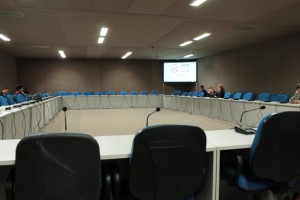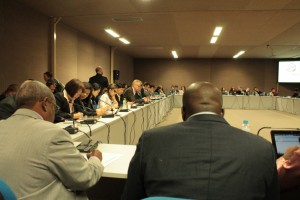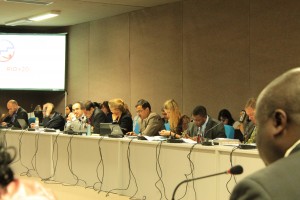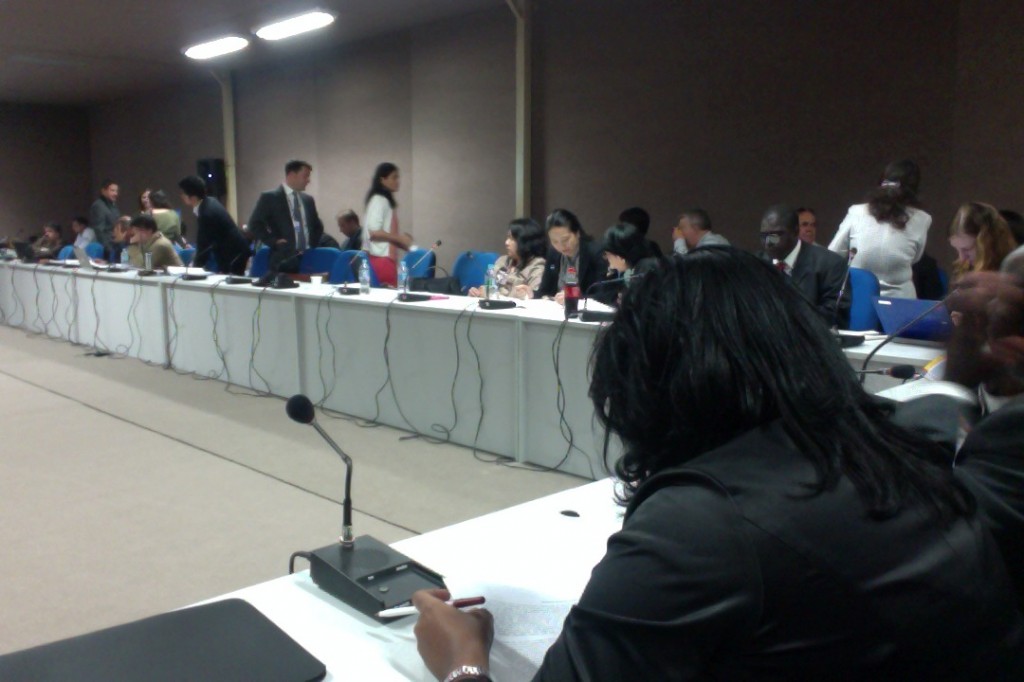El Futuro que Queremos será imposible si tenemos este presente.

La sala de la asamblea, casi vacía.
El cuarto es gris, con alfombras, mesas una a la par de otra creando las orillas de un rectángulo. Nueve sillas adelante y detrás, dieciséis a cada lado. 50 asientos azules que recibirán a los delegados oficiales de distintos países que vienen aquí a discutir, de acuerdo a la agenda, más sobre las Metas de Desarrollo Sostenible.
Llego temprano, y hay solamente 5 delegados sentados en la mesa. A medida que pasa el tiempo se va llenando la sala. Las bocinas están reproduciendo música en inglés, canción tras canción de canciones que he escuchado en fiestas, o en la radio desde que vivo en Estados Unidos. Todas las personas vestidas formales, sacos, faldas, corbatas, camisas, zapatos altos. Los delegados usan colores que combinan con el cuarto, y al parecer también con sus actitudes: serios, ocupados.

La sala de la asamblea, con negociadores pero sin ambición.
Una mujer con un sari me hace sonreír cuando la veo, y toma su lugar en la mesa de delegados. Una de las pocas muestras de tradiciones no occidentales visibles en la habitación.
Todos los delegados oficiales tienen un cuaderno y una pantalla frente a sus ojos, escribiendo frenéticamente.
A medida que la habitación se llena se va escuchando más el murmullo mezclado de tantos países. La mayoría en inglés, pero sonidos de voces y acentos humanos que por lo general son endémicos también encontraron su camino hasta acá.
Quince minutos después de la hora a la que debía comenzar, la discusión inicia. El chair (el presidente de la asamblea) comienza por preguntarle al delegado de la Unión Europea, un señor con un acento balkano, si se decidió lo que quedaron por decidir la noche anterior. El delegado responde negativamente, y pide más tiempo. Estados Unidos se une a los corchetes que puso Canadá en el párrafo 7 del texto sobre Tecnología. Siempre que los países tienen algún desacuerdo sobre algo que está, o no está, en el texto, ponen corchetes (de ahí que nos llamemos Earth in Brackets). Y con ese ritmo, lento, letárgico, las negociaciones avanzan, poco a poco. Faruq, un representante del Grupo de los 77 (un Grupo que inicialmente fueron 77 países en desarrollo) hace notar que ese grupo político quiere convertir toda esa sección en dos líneas.
Próximos corchetes: El chair le pregunta México y Suiza si quieren/pueden remover sus corchetes de la siguiente oración en el texto:
Reafirmamos que el comercio internacional es un motor para el crecimiento y [promover el] desarollo [sostenible – Suiza, México]
México responde negativamente, y Suiza aclara que esto le parece de vital importancia. Otra de las delegadas aclara que el Acuerdo de Accra tiene contenido similar a lo que Suiza y México quieren incluir (para apoyarlos) G77 responde que esta frase está en miles de otros documentos, y que apoyaría su uso en este caso, pero que sabe que no va a hacer ninguna diferencia.
Estas son personas que han estudiado esto por años y años. ¿Es que de veras quieren apegarse a una frase que simplemente reflejaría algo que ya todos sabemos? ¿Es que las delegaciones de la Unión Europea, Estados Unidos, y demás países en realidad no pueden ponerse de acuerdo? ¿Será que crean esta clase de entretenimiento sólo para evitar que lleguemos a otras partes del texto más controversiales?

Volteo, y una de las delegadas sentada justo frente a mí, está en Skype. El de la par está leyendo una revista que le acaban de dar sobre algún tema de los que trata la ONU.
Entiendo que éste sea el futuro del mundo, pero éstas son personas que no se conocen, que al parecer no confían unos en los otros, y que no están dispuestos a ceder. Encima de eso, queda sólo un día más de la última ronda de negociaciones antes de Rio+20, donde se deberá llegar a un acuerdo sobre El Futuro que Queremos. Un proceso lento, frustrante, y que no parece tener ningún resultado positivo.
Ha pasado sólo una hora de las tres que se supone que va a tardar esta ronda de negociaciones. Guardo mi cámara en la mochila, me levanto, y camino hacia la puerta, que ahora se encuentra atascada de gente. Pido permiso en español y portugués y salgo. Detrás de mí quedan los acentos, las computadoras, los cuadernos, la discusion que va en espiral, y mi actitud optimista hacia los procesos de negocios multilaterales.






